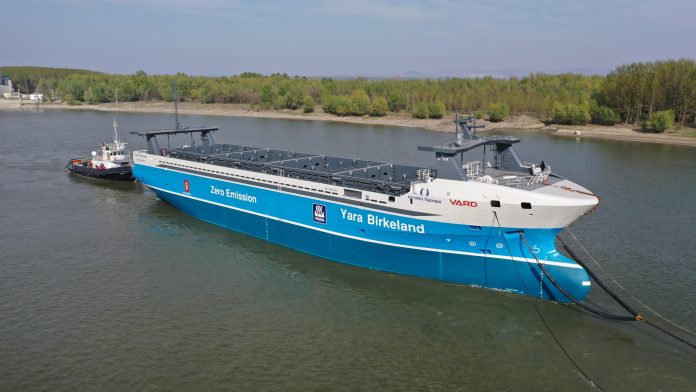
Collaboration is key to address the global challenges that lie before us. Digitalisation and efforts of the decarbonisation of global shipping will be the main drivers of a sustainable post-Covid-19 recovery. If we all work together, we can ensure that shipping has a truly sustainable, efficient and decarbonised future, writes the Secretary-General of the International Maritime Organization (IMO) Kitack Lim.
We must support the global fight against climate change. We cannot shy away from the energy transition in shipping, to meet the ambitions in the initial IMO greenhouse gas (GHG) strategy and ultimately phase out shipping’s greenhouse gas emissions.
The strategy calls for total annual GHG emissions from shipping to be cut by at least 50% by 2050 compared to 2008. Short-term measures to improve ships’ carbon intensity were approved at IMO this week.
Amendments to MARPOL Annex VI have been approved at our Environmental Protection Committee meeting and are expected to be formally adopted next year.
The package of amendments to MARPOL Annex VI reflects the collective commitment to work towards decarbonisation of shipping in keeping with the Initial Strategy and represents a compromise that was the borne out of long and challenging discussions.
It was not easy. Many viewpoints were expressed. The outcome is a highly important compromise based on hard work and solidarity over several years, marking a milestone in the further progress by IMO towards decarbonisation.
The approved amendments are important building blocks without which future discussions on mid and long-term measures will not be possible.
A great deal of work on the implementation of the measures lies ahead of us, but I am confident that, the with the IMO community’s spirit of co-operation, we will be able to make rapid progress with the development of technical guidelines and a Carbon Intensity Code as well as the essential further work on the comprehensive assessment of impacts of the measures on developing countries.
It is imperative that we remain united in working towards a truly global regulatory framework that implements the Initial GHG Strategy.
Regulation is one side of the coin, to phase out emissions, new technologies, new fuels and innovation are needed – meaning, huge investments, notably in R&D and infrastructure.
IMO is stepping up its efforts to act as the global forum and promoter of R&D in zero-carbon marine fuels, bringing together numerous stakeholders, from the public and private sectors, banks and other donors. I strongly encourage shipping and logistics partners to be a part of this.
We must ensure that no country is left behind in the transition to carbon-neutral shipping. IMO leads a portfolio of continuously expanding capacity building projects supporting decarbonisation, and innovation. This collaborative approach is crucial for decarbonisation in the shipping industry.
Collaboration is also critical to fighting the Covid-19 pandemic, which has brought unprecedented challenges, with global, severe and long-lasting effects. And yet, the past months have shown us just how connected we are.
The maritime sector is at the heart of connecting global supply chains around the world and has shown surprising resilience in continuing to deliver vital goods and supplies.
The world relies on a safe, secure and efficient international shipping industry – and this is provided by the regulatory framework developed and maintained by IMO.
As a specialised agency of the United Nations, IMO is the global standard-setting authority for the safety, security and environmental performance of international shipping. Its main role is to create a regulatory framework for the shipping industry that is fair and effective, universally adopted and universally implemented.
Despite the tremendous challenges throughout the pandemic, this regulatory framework has allowed international shipping to keep the trade flowing within regions, and between continents.
For this, we also have to thank the more than one million seafarers on board the world’s merchant ships. Their dedication and professionalism in the face of mounting challenges is worthy of our great admiration and gratitude.
IMO has spared no efforts, working with Member States, UN agencies, and the shipping industry to ensure that operations can continue safely, not least through the facilitation of crew changes.
I have been impressed with the level of co-operation and collaboration across the maritime sector since the Covid-19 pandemic took hold. But we have much work yet to do. Our focus must be on finding solutions and preparing for the post-COVID world. The ability for shipping services and seafarers to deliver world trade is central to responding to, and eventually overcoming this pandemic.
Covid-19 has presented challenges, but we must seize the opportunities of digitalisation in the maritime sector to enhance the resilience of the maritime supply chain and to support sustainable development and recovery.
Digitalisation, big data, and new and smart technologies such as artificial intelligence and hyper-connectivity are keys in taking shipping into a new era.
IMO is working to ensure shipping can embrace the digital revolution – while ensuring safety, boosting environmental protection and managing cyber security risks.
The wider endorsement of the maritime single window concept is needed, to strengthen efficiencies, by allowing submission of all information required by various Government agencies through one single portal and to streamline port activities to the benefit of the supply chain.
Co-operation between shipping, ports and aids to navigation will be vital for enhancing the efficiency and sustainability of shipping and therefore facilitating trade and fostering economic recovery and prosperity.
Covid-19 challenges and subsequent recovery, digitalisation and especially decarbonisation are the three current major challenges which exemplify the maritime sector’s need for an international, co-ordinated response.
If we all work together, we can ensure that shipping has a truly sustainable, efficient and decarbonised future.







